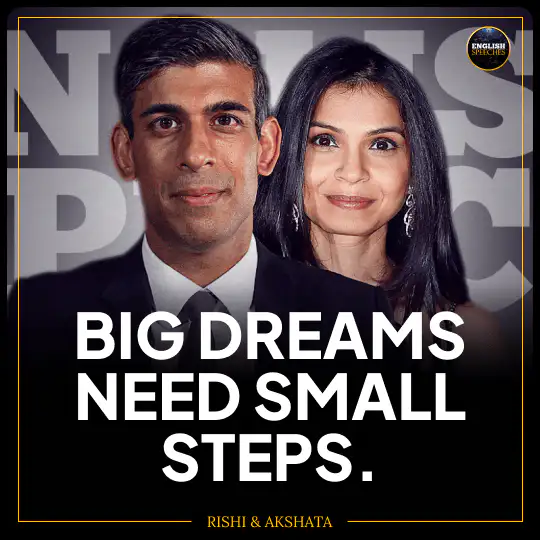Learn English with Rishi Sunak and Akshata Murty. At Stanford GSB’s 2025 Commencement, this dynamic couple shares powerful reflections on intuition, idealism, and duty. With humour and heart, they explore how Stanford shaped their journey from classmates to national leaders. This 2025 speech blends personal stories with practical advice. Perfect for English learners and future leaders.
Who This Speech Is For
Learners interested in leadership, relationships, and personal growth.
Those wanting to explore British and Indian English in a conversational, storytelling style.
Intermediate to advanced learners studying life lessons and cultural reflection.
How This Speech Helps Your English
Hear natural British and Indian English in a warm, collaborative tone.
Learn expressions for describing intuition, decision-making, and ambition.
Study how personal anecdotes are used to structure powerful arguments.
Improve comprehension of abstract ideas through real-world examples.
Why This Speech Matters
Offers unique insight from the UK’s Prime Minister and a leading entrepreneur.
Shows how intuition, values, and action shape public and private leadership.
Encourages future changemakers to lead with heart and humility.

”Big dreams need small steps.
Download available
for Plus Members
PDF Transcript
Access the full speech in an
easy-to-read PDF format.
Audio Version
Listen and download clear,
high-quality MP3 recordings.
English Lesson
Includes vocabulary
and grammar practice.
Offer ends in:
Offer ended.
Transcript
Dean DiMazzo: Now I have the pleasure of introducing our speakers, Akshata Murthy and Rishi Sunak. As you will hear more about shortly, Akshata and Rishi, both members of the class of 2006, met right here at the GSB.
Throughout their lives and careers, they have been dedicated leaders in the private and public spheres. Akshata has spent over a decade investing in early stage, consumer focused British companies, and currently leads the office of Akshata and Rishi Sunak, which promotes initiatives to drive positive impact in the UK. She is a trustee of her alma mater, Claremont McKenna College, and sits on the board of the Victoria and Albert Museum.
Rishi has spent the last decade in the UK government, where he was Chancellor of the Exchequer before becoming the country’s 57th Prime Minister. He was the first British Asian Prime Minister and the youngest person to take on the role in 200 years. He is currently a member of parliament and serves as the William C. Edwards Distinguished Visiting Fellow at the Hoover Institution.
Together, they have journeyed from Stanford to 10 Downing Street and beyond. Please join me in welcoming Akshata Murthy and Rishi Sunak.
Rishi Sunak: Okay, Dean DiMazzo, thank you for your very kind words of introduction and for giving us the honor of joining you all today. Now we’ve all just rightly applauded the faculty and staff for their brilliant work and your friends and family for their love and support. But last and by no means least, class of ’25, you made it. So congratulations. It’s time to give yourselves a massive round of applause.
Akshata Murty: Now, we remember our own ceremonies so well. It was actually the first time our parents met. So it’s wonderful to return in slightly less stressful circumstances. Stanford was transformational for us. I came here from India via Los Angeles, and Rishi from the UK. It opened our eyes to a whole new way of thinking, and it’s informed everything we’ve done since.
It also changed the course of our lives, because this is literally where we met, in the Schwab courtyard, to be precise. Now, who needs admissions algorithms when as our then admissions director, Derek Bolton, who’s here with us today, has since told us, he could see we were meant to be together before we had even met, just from reading our admissions essays alone. So thank you, Stanford. 20 years and two daughters later, forget about being the best business school in the world, you’re an even better matchmaking service.
And now here we are, so honored to be the first GSB couple to do a commencement speech together. Rishi and I approach things quite differently. So let’s just say the process of preparing for today has been just a little bit revealing. I’ve heard couples therapy can be quite painful, but upon reflection, that might just have been the easier option.
But on a more serious note, it’s also been incredibly rewarding because it’s allowed us, the both of us, to reflect on who we are and how our experience here at the GSB has played such an important role in shaping our life together.
Rishi Sunak: And our different approaches have meant that we could push each other’s thinking to become something better, sharper, deeper. We are each other’s force multipliers. And today, we’d like to share three lessons that we’ve learned from our own two-person tea group, if you will, which we would have found helpful sitting where you are today.
Now, the first lesson is what I’ve learned from Akshata about the false comfort of data alone. Now, I’m a numbers guy, which was in fact a very helpful way of bonding with my father-in-law, Narayan Murthy. Now, he’s a pioneer of the Indian software industry, founded the company Infosys, and he lives by the saying, “In God we trust, everyone else must bring data to the table.” And I couldn’t agree more.
That deep respect for data and analysis has given me the edge in every role that I’ve had since leaving the GSB. So, well done for surviving data and decisions. But that depth of understanding will be relevant for everything else that you do, the full extent of which will be actually impossible for you to comprehend right now.
For example, little did I know that sitting in that class, the techniques that I learned there would help me 15 years later to understand SIR models, R numbers, exponential growth curves, as our government grappled with a once in a century pandemic. In 2021, after months of lockdowns, the new Omicron variant of COVID emerged in South Africa and started to spike in the United Kingdom.
I was Chancellor of the Exchequer at the time, and I was actually here on a trip, visiting with CEOs, investors, Stanford faculty. I got a panicked call in the middle of the night and I had to cut my trip short, jump on a plane, fly back to Westminster, where I found that there was huge pressure for another national lockdown.
Now, I probably would have felt the same if it hadn’t been for my understanding of data, which meant that I could interrogate what was really happening in South Africa and that analysis raised questions for me. But, and it’s a big but, that’s only as far as it could take me.
I used to find comfort in the idea that data could always provide a certain answer. Black and white was reassuring to me. But my wife pushed me to think differently. While I’m the quant in our relationship, Akshata is definitely the poet.
From our early days together, I’d try and join her for runs around the loop as an excuse to spend more time with her. And we’d chat as we ran, or more accurately, she would try to run, I would try to chat.
But as our relationship deepened, she’d encouraged me to understand that without giving up my love of analysis, I also had to tune in and trust my intuition, born of experience and values, however uncomfortable it made me feel.
On reflection, I was seriously unfit and had all the wrong kits, so the running was pretty uncomfortable too. But Akshata helped me see that data can’t look around corners. It can’t make the decision for you. And through her confidence, I grew to trust my own instinct more too.
And at that moment, back in December ’21, as Omicron came to the UK, it took intuition and not a spreadsheet to argue strongly against the prevailing belief that we needed another national lockdown with all the serious consequences involved. It was a big call, but categorically the right one.
And the reality is, as a leader, the only decisions that reach your desk are the difficult 50/50 ones. Because if a decision could be answered with data or analysis alone, someone else would have made it already. And nowhere is that more the case than when you’re sitting behind the prime minister’s desk at 10 Downing Street.
So here’s the thing. As you progress in your own careers, learn to listen to your intuition with as much respect and rigor as you do the analysis. Because if you want to lead, it’s not a question of data or intuition. You’ve got to get comfortable with both.
Akshata Murty: The second lesson is what I’ve learned from Rishi, and it’s about the relationship between big idealistic dreams and small practical steps.
I grew up in a country where the gulf between rich and poor was vast. I also grew up in a family where my parents inspired me to bring about widespread change, and I desperately wanted to be in their footsteps. In my Stanford essay, I spoke passionately about education, impact, and service.
When I started here, my ideas had crystallized into what I call a form of die-hard idealism, an equality which I perhaps naively saw then, and I admit now, as somehow morally superior to every other thing.
Coming to Stanford, of course, I hoped to learn from other idealists with big dreams like mine. What I didn’t expect to find, however, was a profound connection with someone whose first question was always how.
While we were at the GSB, there was no one more annoying than Rishi when we would go on a run. He would beg to come and then he would want to talk to me the whole way around the loop. He was wearing these seriously uncool pair of sneakers and three-quarter-length cargo shorts. I used to call them weeder shorts, which had pockets everywhere.
But, there was no one more intriguing than Rishi when he was talking to me about how to affect social change at scale. I genuinely hadn’t met anyone my age who spoke like that. Might not have been his thing, but at least there was some substance.
Idealism is inspiring, but he helped me see that if it’s untethered from reality, there is no traction. You float without impact.
I learned from him that the path to achieving something transformational is rooted in the gravity of tangible steps in the real world of the everyday. These steps are small, they’re detailed, they’re unglamorous, but they’re also crucial for a vision to bear fruit.
When I think back to my time at the GSB and I think of Jeffrey Pfeffer’s class called Paths to Power — actually, Rishi, a class I took as my excuse to spend more time with you — we learned how to get things done.
And if you think about it like that, an idealist with nothing to show for it is just an idealist. A practical idealist, however, can achieve the remarkable.
Both Rishi and I believe in the power of education to transform lives and to drive social mobility. Both our families are living proof of this idea. But while that’s a big dream, the gritty question of course is, how? What is that tangible next step?
In direct answer to that, I founded a program called Lessons at 10 when we were living in Downing Street. It was all about inspiring and educating young people across the UK. And earlier this year, Rishi and I have launched the Richmond Project to give young people confidence with numbers, to improve their numeracy skills, and to build their financial literacy.
Examples of big idealistic dreams achieved through those small practical steps.
So what I learned is that actually, being practical is a power move. It’s not the enemy of idealism as I once thought, but it’s a running partner. Because if you want to make big dreams a reality, it takes both.
Rishi Sunak: And the third lesson is what we’ve learned together about the importance of worrying far less about the outcome. It’s a concept known in Sanskrit as dharma, the idea that we should gain our fulfillment from simply doing our personal duty rather than from any rewards that may come with our efforts.
Akshata Murty: Rishi and I started talking about this idea without knowing it right at the very beginning, as we were just getting to know each other. When we would meet up at Arbuckle Cafe for breakfast and ponder what the future might hold for us. That, and whether 11 a.m. was too early for some ice cream for Rishi. Now, it really does turn out that 11 a.m. is not too early.
The concept of dharma has been an ongoing conversation, a guiding principle ever since. Successes and failures are part of the package that comes with leadership. And it doesn’t matter who you are, in business or in politics, you will feel that on a deeply personal level, not least because the criticism can be noisy, it can be relentless, and it can be distracting.
Rishi Sunak: Obviously, you don’t walk through the door at number 10 Downing Street without understanding this, but I’m so grateful that Akshata and I shared this commitment to dharma, especially at the hardest moments, because it helped get us through them together.
In the summer of 2022, I failed in my bid to become leader of the Conservative Party and Prime Minister. After fighting incredibly hard for what I believed was right, it was a very difficult blow. But the flip side of that disappointment was that I got to spend more time with my family after a grueling few years.
It felt good focusing on being a member of parliament, a husband, a dad. Our girls were thrilled that they got to go to TGI Fridays more often. The dog was thrilled to go on many more walks. And even Akshita was thrilled, I think, to have her running partner back. This time with considerably better gear, I might add.
But six weeks later, my predecessor resigned. There had been a run on the pound, inflation was at a 40-year high, and the opposition party had a 36-point poll lead, which would require a monumental turnaround even at the best of times.
Now, all politicians, if they’re being truly honest with you, are a mixture of ambition and duty. A purely ambitious politician would at this point have sat out the impossible situation.
That weekend, Akshata and I were in different places and we could only speak in snatched moments on the phone. But she reminded me that my dharma was clear. It was my duty to do the job because I felt that I could help my country at a very difficult situation. And two days later, I became prime minister.
And it was a battlefield promotion at a time of crisis and one that I’ll always be proud of.
Akshata Murty: So here’s the lesson. Dharma isn’t just relevant in public service. It means that you’ll have the resilience and clarity you need to overcome whatever’s thrown at you without losing your way or being submerged by ego. It’s not only a fulfilling way to live your life, but it will enable you to do much more than you ever thought possible.
Rishi Sunak: So, thank you, class of ’25, for listening to our story of data, dreams, and dharma. Now, the potential of your individual stories is immense, but you can’t achieve that potential alone. So surround yourselves with people who can and do challenge your thinking.
It might be your tea group of two. It might be your team of 22. It might be the person you’re sitting next to right now. Whoever they are, find your force multipliers, people who make you think better, sharper, deeper.
Akshata Murty: And stay open to what they say. Sometimes it will scare you. Sometimes it might annoy you. But always it will help you become a better person.
You will all have fought such strong friendships here. Take care of those relationships, and especially the differences between you, because they might just be the most consequential forces in your life.
Rishi Sunak: And as our own fantastic class of ’06 prepare for our 20-year anniversary next year, and as the GSB celebrates its centennial year, a final thought. We were the first Stanford graduates to live in number 10 Downing Street. But both Akshata and I have every hope that we are not the last to live behind an important door at an important time. Because the world needs global leaders like the ones being honed right here.
Akshata Murty: We know you’re all going to make Stanford proud and we’ll be applauding you all the way.
Rishi Sunak: So get out there, change lives, change organizations, change the world.






